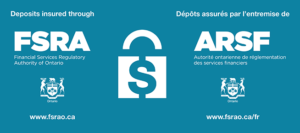Saving for a down payment on your first home is no small feat, and in our current economic landscape, prospective home buyers need to be savvy and take advantage of opportunities to maximize their savings goals.
The First Home Savings Account (FHSA) is the newest registered plan allowing Canadians to save for their first home tax-free (up to certain limits). Similar to a Registered Retirement Savings Plan (RRSP), every dollar you contribute to your FHSA reduces your taxable income for the year. Unlike an RRSP however, when you withdraw funds from your FHSA to purchase a qualifying home, you do not need to pay them back to avoid penalties.
The FHSA is a great investment tool for new home buyers with annual contributions capped at $8,000 and a lifetime contribution limit of $40,000. For added flexibility, you can carry forward a maximum of $8,000 unused contribution room to the following year.
Each spouse or common-law partner can open an individual FHSA and both can use their accounts towards the purchase of the same home. Together, they have a combined annual contribution limit of $16,000 ($8,000 per person) and a lifetime limit of $80,000 ($40,000 per person). However, they are not allowed to contribute to each other’s FHSAs.
Other things to know about the First Home Savings Account:
- It is eligible to Canadian residents aged 18-71 who have a valid Social Insurance Number (SIN) and are considered a first-time home buyer.
- Applicants cannot own or jointly own a qualifying home (nor can their spouse or common-law partner) being used as their principal residence in the calendar year before the account is opened or the preceding four years.
- Applicants must not have withdrawn funds from their RRSP under the Home Buyers’ Plan (HBP) or must have repaid any HBP withdrawals to their RRSP before the year they plan to open an FHSA.
- Parents/guardians and grandparents can contribute to their child’s/grandchild’s FHSA but only the FHSA holder is eligible for tax deductions.
- When a qualifying withdrawal is made, the amount withdrawn is not taxable. For a withdrawal to qualify, the applicant must intend to occupy the qualifying home as their principal place of residence within one year after buying or building it.
| Features | FHSA | TFSA | RRSP |
|---|---|---|---|
| Purpose | Down payment for a home | General short- or long-term savings | Retirement savings |
| Contributions are tax-deductible | x | ||
| Contribution limit | |||
| Contribution limit based on earned income | x | x | |
| Spousal contributions allowed | x | x | |
| Withdrawals for qualifying home are tax-free | x | ||
| Repayment of withdrawal for qualifying home required | x | x | |
| Maximum age limit | x | ||
Features & benefits
- Contributions reduce taxable income
- Savings grow tax-free in the plan
- Spouses or common-law partners, who are eligible to open an FHSA, can each contribute to their own FHSA and use the funds to buy the same home
- Tax-free withdrawal for qualifying home purchase
- Ability to contribute to an FHSA and participate in the Home Buyers’ Plan at the same time
- No repayment required for withdrawal to purchase a qualifying home
- Unused funds can be transferred to an RRSP or RRIF to continue tax-sheltered status
First Home Savings Account participation room
The FHSA participation room represents the maximum amount a holder can contribute to their FHSAs or transfer from their RRSPs. While a holder may have multiple FHSAs, the total contributions and transfers to all accounts must not exceed their annual FHSA participation room.
In the year a holder opens their first FHSA, their participation room is $8,000, with an additional $8,000 added each subsequent year until either the maximum participation period or the lifetime limit is reached.
The holder’s FHSA participation room will be detailed in their annual notice of assessment or reassessment from the Canada Revenue Agency (CRA).
Exceeding First Home Savings Account participation room
If a holder’s contributions and transfers from RRSPs exceed their FHSA participation room, the excess amount will incur a tax of 1% per month on the highest excess amount present each month. This excess can be reduced or eliminated as additional FHSA participation room becomes available. Alternatively, the holder can make a designated withdrawal or a designated transfer to an RRSP/RRIF, neither of which are taxable.
Withholding tax schedule of rates:
- Your FHSA can remain open for a maximum of 15 years or until the end of the year you turn 71.
- Any unused FHSA contributions can be transferred, without being taxed, to another registered account, such as your RRSP or RRIF.
- Your FHSA can hold a variety of qualified investments, including cash, GICs, and mutual funds.
- At WFCU and its divisions, eligible deposits in your FHSA are fully insured.
Tax deduction
The account holder is eligible to claim a deduction for their First Home Savings Account contributions.
Contributions to an FHSA function similarly to RRSP contributions. They can be claimed as a tax deduction either in the year they are made or carried forward to be deducted in a future year.
The FHSA contribution period runs from January 1 to December 31. Unlike RRSPs, contributions made within the first 60 days of the year cannot be deducted for the previous tax year.
Transfers from an RRSP to an FHSA are not deductible. Contributions made after a qualifying withdrawal cannot be deducted at any time.
At a glance
Variable FHSA
- No minimum investment required
- Use regularly scheduled automatic transfers to build your FHSA investments
- Interest is calculated on the minimum daily balance and paid quarterly
- Can be invested into a fixed-term FHSA after reaching a $500 balance
Fixed FHSA
- Minimum investment of $500
- Select from terms of one month up to five years
- Competitive interest rates offered
- Interest is compounded annually back to the First Home Savings Account
PLUS…
FHSA elsewhere?
Switch to WFCU and its divisions and we will refund up to $75 of any transfer-out fee
The information provided here is for general purposes only and is not intended as specific advice on legal, accounting, financial, or tax matters. We strongly recommend seeking professional advice tailored to your individual circumstances before making any decisions based on this information. While we strive to ensure the accuracy and completeness of the information, WFCU Credit Union does not make any express or implied representations or warranties regarding its content. We accept no liability for any loss or damage resulting from the use of or reliance on this information. Please note that the information in this brochure is based on the current status as of May 2024 and may change. WFCU Credit Union is not responsible for updating or revising the information due to changes made by the Canadian government, Canada Revenue Agency, or other regulatory bodies.










